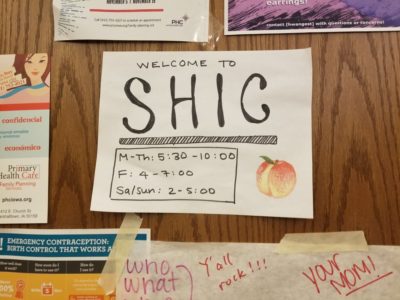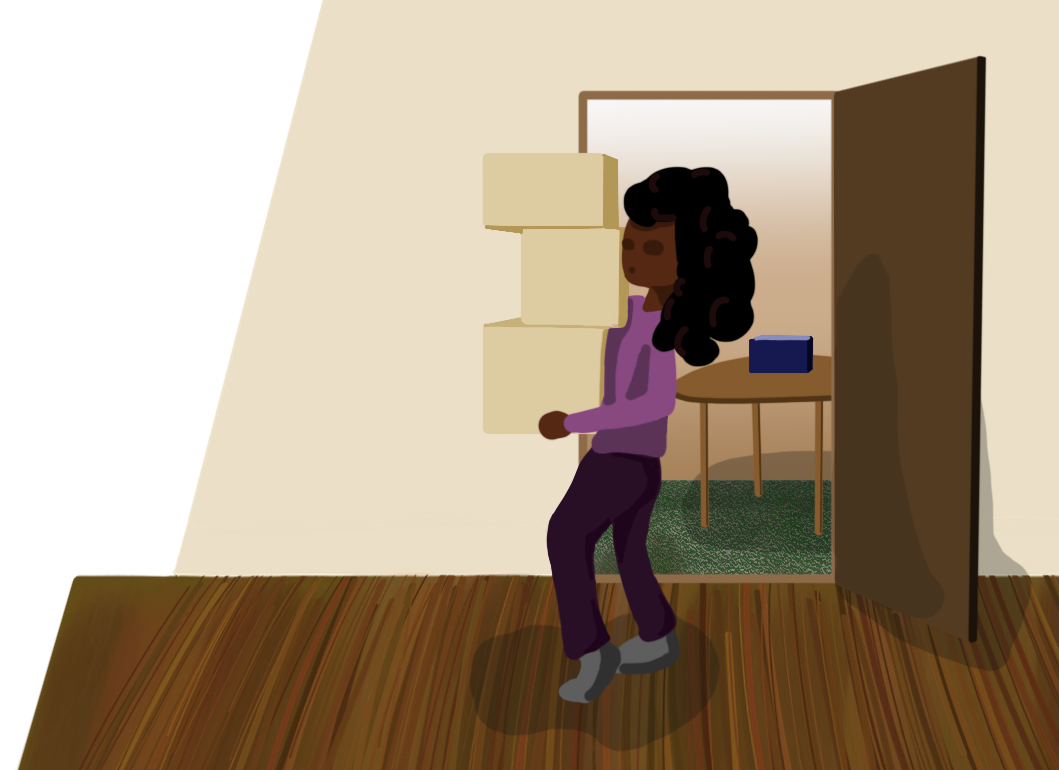After a tumultuous 2020, the Sexual Health Information Center (SHIC) is not only navigating the murky waters of sexual health and COVID-19 restrictions, but also setting up new foundations by partnering with the Student Health and Wellness Center (SHAW). With a new physical space and staff trainings with medical experts, SHIC is reaffirming their core mission: to help support students’ sexual health.
“With so many people during lockdown experimenting with their gender and sexuality … we see the need for SHIC more than ever,” said Em Odesser `23, a staff member for SHIC.
SHIC is run by student staff who advise other students on sexual health. The center provides contraceptives and menstrual products, as well as helping to guide individuals who are questioning their sexual/gender identity. In addition, SHIC offers a selection of dildos, vibrators and other pleasure products for purchase by students, emphasizing the importance of understanding your body for purposes of self-pleasure.
“[SHIC] is a judgement-free area where you can get snacks, bond with your friends and get a t-shirt, but it is also the last line of defense. It is a really important resource to have in rural Iowa,” said Odesser. “Where else will people get resources?”

Transition to SHAW
In January 2020, the Department of Student Affairs temporarily shut down SHIC due to concerns over the liability involved in distributing medical products. Because SHIC had originally been under the umbrella of Student Government Association (SGA), Student Affairs was concerned about the quality of staff trainings and the safe distribution of products related to sexual health, believing that SGA was not equipped enough to handle certain medical questions and guidelines.
After protests by a number of students and alumni, SHIC had a limited reopening in February 2020, only offering Plan B, contraceptives and menstrual products. Odesser was one of the students involved in opening SHIC up again. She said that a petition to reopen SHIC received 350 signatures within the first 24 hours of its release.
“Nobody knows better than us what would happen if we were to lose such a significant resource,” Odesser said.
Over the summer, student leaders in SHIC agreed to partner with SHAW to address the issues brought to their attention earlier in 2020. Terry Mason, dean of health and wellness, started his position in February 2020, right after SHIC was closed. He said he was surprised to learn of its closure upon hearing about the resources they provided to students.
It is a really important resource in Central Iowa … Where else will people get resources? -Em Odesser ’23
“The products they distribute serve a very, very important function,” said Mason. “SHAW also offers these products, … but SHIC can offer these products after hours on the weekends.”
SHAW is open only on the weekdays, while SHIC is open on weekdays and weekends as well. In addition, SHIC is open after SHAW’s 9-5 PM workday, making the office more accessible to students who may have classes during that time block.
“Instead of dictating what [students] need to do, what’s important is for us to discuss and find out where they are going, and [for administration] to offer some advice about how best to get there,” said Mason. “My experience in my short time here at Grinnell is that our students by and large are very responsible and very open to not only keeping themselves safe but keeping students safe.”
“As a student in Grinnell, I trust the people on the team when I need to ask for help,” said Nazma Noray `23, a staff member for SHIC. “I can ask them if I have questions.”
Previously located on the first floor of Main Hall, SHIC has been a safe space for students to ask questions regarding sexual health without going through the more formalized process of making an appointment at SHAW. In the fall, SHIC will move, along with SHAW, to a bigger, more welcoming space with windows and better ventilation that has yet to be finalized.

Bringing SHIC under the umbrella of SHAW also puts them in touch with medical experts and a larger pool of resources. Notably, SHIC staff will now have access to more trainings on topics like Title IX, harm reduction, gender and pleasure products. The partnership also allows them to collaborate directly with sexual harm advocacy group, Grinnell Advocates.
Sexual health in a pandemic
SHIC’s role has changed since the beginning of the pandemic. Now, the office stands at the forefront of a larger debate between student wellness and adherence to COVID-19 protocols. As liaisons between the administration and the student body, SHIC staff see themselves in a unique position to redefine the working relationship between the two.
Within the SHIC Advisory Board, the question of how medical amnesty fits into strict COVID rules on social distancing and substance use is difficult to navigate. While SHIC’s primary purpose is to encourage sexual health, compliance with COVID-19 safety measures (e.g., social distancing) creates a gray area when it comes to students and sex. However, Title IX Coordinator Bailey Asberry noted that the priority is ensuring there are no barriers for students seeking help.
“We’re not trying to police relationships. We’re not trying to say, ‘Students can’t have sex’ or ‘Students can’t have relationships,’” said Asberry. “What we want is for people to use their judgment to make healthy decisions.”
For Leah Johnson `19, post baccalaureate fellow for sexual respect and harm reduction, the approach to sexual health during a pandemic has also been one of support.
“If you went to Bailey Asberry and said, ‘Hey, this thing happened to me while I was drunk,’ she’s going to say, ‘How can I help you?’ She is not going to say, ‘You were intoxicated and the campus is dry right now, so you have to go do something,’” said Johnson. “That is not the concern in that moment. The concern is, ‘What resources do you need?’”
Challenges and next steps
As part of the partnership between SHAW and SHIC, Mason chairs the SHIC Advisory Committee, which meets biweekly and is made up of both students and staff. Student leaders Zama Buthelezi `21 and Durowaa Agyeman-Mensah `22 are currently working on crafting short- and long-term vision statements for SHIC with SHAW and Student Affairs staff.
However, this new foundation has not come easily. The pandemic delayed SHIC’s transition to SHAW, and the implementation of a new campus-wide student employment policy led to difficulties in hiring a staff and getting paid. Currently, only five students work for SHIC, compared to around 15 in previous years.
It’s not very often that queer kids of color get to do something like this. -Zama Buthelezi ’21
Issues with communication between the administration and SHIC have also led to discord. Initially, the intervention of Student Affairs felt like a conduct process or punishment for wrongdoing on the part of SHIC, said Buthelezi. Additionally, last summer SHIC leaders received inconsistent and infrequent response from Student Affairs to repeated email efforts to plan for the fall.
Due to these frustrations, SHIC leaders were thus more motivated to make sure SHIC is responsive to students, not administrative demands.
“We are an organization that is concerned with student health,” said Buthelezi, emphasizing SHIC’s “for students, by students” approach. “We are not selling out to admin. … We are not SHAW Jr.”
With a restructured SHIC, student staff members now have more formalized roles detailing what kinds of support they can give to other students. Buthelezi and Agyeman-Mensah said they are keenly aware of how essential this internal reorganization is and are focusing their efforts on setting the right precedents for the future.

Currently, SHIC staff are working on improving their outreach in collaboration with Peer Educators, also supervised by SHAW to be a student health resource. Staff post on their new Instagram page, @gcshic, promoting events and providing information about the importance of self-pleasure, understanding your body and more details about SHIC.
SHIC staff said that their worries about SHIC’s longevity, passing the torch to first- and second-years has been on staff’s minds, have been assuaged a bit by their partnership with SHAW.
“[Outreach] is really difficult,” said Agyeman-Mensah. “Next year, almost three-quarters of the student population will not really understand what SHIC is all about.”
Buthelezi emphasized that SHIC staff, many who are queer students of color, are in a prime position to help underrepresented students have a voice in decisions and messaging when it comes to student health.
“It’s kind of cool that SHIC was picked up by admin. So, let’s see what we can do with it, in terms of experimenting with this kind of student power,” said Buthelezi. “It’s not very often that queer kids of color get to do something like this.”
Moving forward, students and supervisors have put together a vision for SHIC as a place for continued experimentations, aspirations, mentorship and above all, connection.
“I’ve never seen anything like SHIC before in my life. I just want people to feel comfortable enough to walk through the door and keep coming back because they’ve enjoyed the conversations they’ve had here,” said Agyeman-Mensah.
“I just want this place to exist,” said Buthelezi.





































































